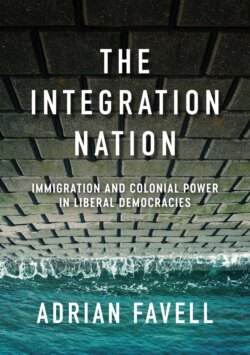The Integration Nation

Реклама. ООО «ЛитРес», ИНН: 7719571260.
Оглавление
Adrian Favell. The Integration Nation
Table of Contents
Guide
Pages
Series Title. Immigration & Society series
The Integration Nation. Immigration and Colonial Power in Liberal Democracies
Copyright Page
Dedication
Thanks and Acknowledgements
Introduction
1Integration as a Paradigm
Integration research as ‘normal science’
Towards a new political demography
Integration and citizenship
Mobilities and diversity
2Integration and Assimilation
Assimilation in US immigration research
Integration or assimilation?
The modernist development paradigm
Immigration/integration nations in the transatlantic imperium
3Integration and Multiculturalism
Integration as the middle way
The republican philosophy of integration
Models of integration
Muscular liberalism and after
4Integration and Race
Integration and desegregation
Technologies of integration
Integration as the production of race/ethnicity
The black box of whiteness
5Integration and Transnationalism
Transnationalism and integration
Migration and development
Bordering
Citizenship, the birthright lottery and global inequalities
6Integration and Decolonization
Coloniality and decolonization
Open borders: towards de-nationalization and decolonization?
Urban and local de-nationalization
Global and planetary integration: COVID-19 and after
References
Index
POLITY END USER LICENSE AGREEMENT
Отрывок из книги
Adrian Favell
As always, it is impossible to thank everyone who has helped me think through and articulate these ideas, but I owe a special word of gratitude to friends and colleagues at the University of Leeds, particularly Bobby Sayyid and Ipek Demir for their attentive and encouraging reading of the manuscript; to Tesfalem Yemane and Kheira Arrouche for the brilliant work they are doing; to Li Sun for our work on China; and to members of the Leeds Migration Research Network, the Bauman Institute and the Northern Exposure project, especially Roxana Barbulescu, Albert Varela, Andrew Wallace, Paul Bagguley and Yasmin Hussain. I am grateful always for my precious connection to the Centre d’études européennes et de politique comparée at Sciences Po, Paris, and its fabulous équipe. Final work on the manuscript was completed as a fellow of the Wissenschaftskolleg zu Berlin, 2021–2022.
.....
The United Kingdom has its peculiarities as a nation-state, but this complicated set of arrangements regarding migration, immigration, free movement and other forms of mobility is not atypical of liberal democracies worldwide. To summarize, the archetypal liberal democratic nation-state – the ‘integration nation’ – is able to define itself when it identifies a (usually small) subset of the mobile international population as ‘immigrants’: those who have crossed a border and ‘settled’, and who are therefore subject to ‘integration’. Going beyond its formal definition (i.e., receiving nationality or a passport), citizenship as full membership will be defined by this process. This imposes a particular kind of obligation on both the state and the immigrant. This obligation does not apply to many other mobile populations, present on or passing through the territory, who are thereby ‘foreigners’ or ‘aliens’ and irrelevant to this question and excluded from it. This is regardless of whether they are in fact socially present, engaged in interactions with or connected in some way in the society – unless, of course, their legal status changes and they become ‘immigrants’. From the point of view of ‘integration’, the anomalous position of long-term or permanent foreign residents, as much as the undocumented or irregulars present, here becomes apparent. Asylum seekers awaiting a decision on ‘settlement’ and ‘immigration’ are also anomalous. Later, we will see how transnational populations more generally create further anomalies for ‘immigrant integration’. These groups are not yet, and may never be, a part of its national population, as defined by the sovereign designation of who is considered a member and who is not. Immigrants in contrast have to be, however diverse they are or however recently they arrived. Their linear progress towards citizenship is crucial to the nation-state’s power. In other words, this process – what is called ‘integration’ – defines the nation-state-society at its borders, as much as the means by which it binds all its members together in some unified and recognized sense as legitimate and formally equal citizens.
The state asserts these powers by naming these processes and its components, and claiming sovereignty over them (Sayad 2004 [1996]). The inherent political demography of nationalism and nation building I have been describing becomes methodological nationalism when it is blindly reflected in research on ‘immigrant integration’, rather than foregrounded and studied: i.e., work that simply assumes the object of study to be the objective process of transforming outsider ‘immigrants’ into insider ‘citizens’ of a pre-existing population container, according to measures of attainment of parity with existing members. Such work overlooks how those same actions work to define, constitute and reproduce the container itself, and how other categories of people are left out, made invisible or fail by definition to attain these statuses.
.....